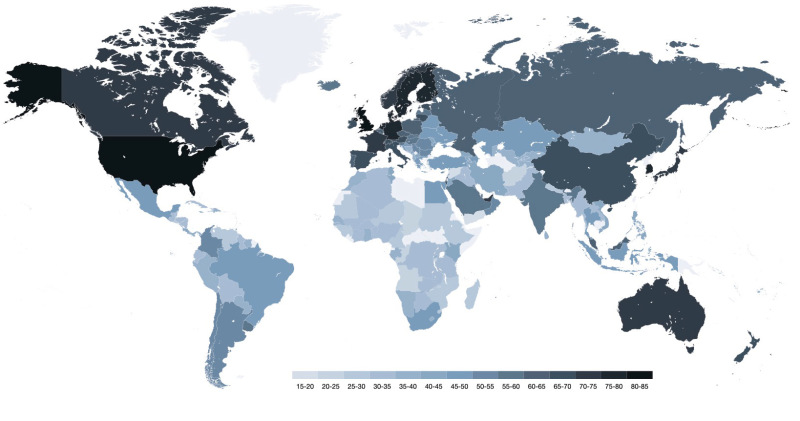
Join Transform 2021 for the most crucial styles in business AI & & Data.Learn more
Damage wrought by AI tends to fall most greatly on marginalized neighborhoods. In the United States, algorithmic damage might cause the false arrest of Black men, disproportionately reject female job candidates, ortarget people who identify as queer In India, those effects can even more affect marginalized populations like Muslim minority groups or individuals oppressed by the caste system. And algorithmic fairness structures established in the West might not move straight to individuals in India or other nations in the Worldwide South, where algorithmic fairness needs understanding of regional social structures and power characteristics and a tradition of manifest destiny.
That’s the argument behind “De-centering Algorithmic Power: Towards Algorithmic Fairness in India,” a paper accepted for publication at the Fairness, Responsibility, and Openness (FAccT) conference, which starts today. Other works that look for to move beyond a Western-centric focus consist of Shinto or Buddhism-based frameworks for AI style and a method to AI governance based on the African philosophy of Ubuntu.
” As AI ends up being international, algorithmic fairness naturally follows. Context matters. We should make sure to not copy-paste the Western normative fairness all over,” the paper checks out. “The factors to consider we determined are definitely not restricted to India; similarly, we require inclusively progressing international methods to Fair-ML.”
The paper’s coauthors concluded that standard measurements of algorithm fairness make presumptions based upon Western organizations and facilities after they carried out 36 interviews with scientists, activists, and legal representatives dealing with marginalized Indian neighborhoods. Amongst the 5 coauthors, 3 are Indian and 2 are white, according to the paper.
Google research study researcher Nithya Sambasivan, who formerly worked to develop a phone broadcasting system for sex employees in India, is the lead author. Coauthors consist of Ethical AI group scientists Ben Hutchinson and Vinodkumar Prabhakaran. Hutchinson and Prabhakaran were listed as coauthors of a paper titled “On the Dangers of Stochastic Parrots: Can Language Models Be Too Big?” that was likewise accepted for publication at FAccT this year, however the variation sent to FAccT does not include their names. That paper was the subject of debate at the time former Google AI ethics co-lead Timnit Gebru was fired and concludes that very big language designs hurt marginalized neighborhoods by perpetuating stereotypes and predispositions. Organizers of the conference informed VentureBeat today that FAccT has suspended its sponsorship relationship with Google.
The paper about India recognizes aspects frequently related to algorithmic damage in the nation, consisting of designs being overfit to digitally abundant profiles, which generally suggests middle class males, and an absence of methods to question AI.
As a significant action towards development, the coauthors indicate the AI Observatory, a job to record damage from automation in India that released in 2015 with assistance from the Mozilla Structure. The paper likewise requires press reporters to exceed service reporting and ask tech business hard concerns, specifying, “Innovation journalism is a keystone of fair automation and requires to be cultivated for AI.”
” While algorithmic fairness keeps AI within ethical and legal borders in the West, there is a genuine threat that naïve generalization of fairness will stop working to keep AI releases in check in the non-West,” the paper checks out. “We should take discomforts not to establish a basic theory of algorithmic fairness based upon the research study of Western populations.”
The paper belongs to a current rise in efforts to construct AI that works for the Global South.
A 2019 paper about creating AI for the Global South explains the term “Global South” as comparable to the term “3rd world,” with a shared history of manifest destiny and advancement objectives. Worldwide South does not imply merely the southern Hemisphere, as northern hemisphere countries like China, India, and Mexico are typically consisted of, while Australia remains in the southern hemisphere however is thought about part of the Worldwide North. China appears to be reserved considering that its AI aspirations and results impart worry in politicians in Washington, D.C. and executives in Big Tech alike.
” The broad issue is clear enough: If fortunate white males are creating the innovation and business designs for AI, how will they develop for the South?” the 2019 paper checks out. “The response is that they will develop in a way that is at finest an anxious fit, and at worst magnifies existing systemic damage and injustice to terrible percentages.”
Another paper accepted for publication at FAccT today and covered by VentureBeat analyzes typical limitations to information sharing in Africa. Composed mainly by AI scientists who matured or reside in Africa, the paper prompts relationships to information that construct trust and think about historic context, in addition to existing patterns of Huge Tech business growing operations in Africa. Like the Google paper, that work reasons from interviews with regional professionals.
” Over the last few years, the African continent as a whole has actually been thought about a frontier chance for developing information collection facilities. The interest around information sharing, and specifically in artificial intelligence or information science for development/social great settings, has actually varied from tempered conversations around brand-new research study opportunities to pronouncements that ‘the AI invasion is coming to Africa (and it’s a good thing)‘ In this work, we echo previous conversations that this can cause information manifest destiny and substantial, permanent damage to neighborhoods.”
The African information market is anticipated to see consistent development in the coming years. Business like Amazon’s AWS and Microsoft’s Azure opened their very first datacenters in Africa in 2019 and 2020, respectively. Such patterns have actually resulted in evaluation of information practices around the globe, consisting of in the Global South.
In 2015, MIT hosted a three-day summit in Boston to talk about AI from a Latin American point of view. The winner of a pitch competitors at that occasion was a predictive design for attrition rates in college in Mexico.

Above: The 2020 Worldwide AI Preparedness Index comparing readiness and capability throughout 33 various metrics
Image Credit: Oxford Insights
As part of the top, Latinx in AI creator Laura Montoya provided a discussion about the Worldwide AI Preparedness (GAIR) rating of Caribbean and Latin American nations, together with aspects like joblessness rates, education levels, and the expense of working with AI scientists.
The inaugural Government AI Readiness Index ranked Mexico greatest amongst Latin American countries, followed by Uruguay and Colombia. Preparedness rankings were based upon around a lots aspects, consisting of abilities, education levels, and governance. Cuba ranked last in the area. When coauthors presented GAIR in 2019, they questioned whether the Worldwide South would be neglected of the 4th commercial transformation. That issue was echoed in the 2020 report.
” If inequality in federal government AI preparedness equates into inequality in AI application, this might entrench financial inequality and leave billions of people throughout the Global South with even worse quality civil services,” authors of the report stated.
In the 2020 GAIR, Uruguay inched ahead of Mexico. At # 42 on the planet, Uruguay is the highest-ranking nation in Latin America. Leading 50 countries in the AI preparedness index are nearly completely in the Worldwide North. And authors of the report tension that having the abilities to advance isn’t the exact same thing as effective application.
Montoya firmly insists that Caribbean and Latin American countries should think about aspects like joblessness rates and alerts that brain drain can likewise be a substantial element and cause an absence of coaches for future generations.
” Total, Latin American and Caribbean do have relatively high education levels, and particularly they really establish more scholastic scientists in the location of AI than other areas internationally, which is of note, however usually those scientists with high technological abilities will leave their native land in order to look for prospective task chances or resources that are not readily available in their native land,” she stated.
Leda Basombrio is the information science lead at a center of quality developed by Banco de Credito del Peru. Speaking as part of a panel on the significance of dealing with market, she explained the problem of attempting to hire Latinx AI skill far from Huge Tech business like Facebook or Google in the United States. Most of AI Ph.D. finishes in the U.S. today are born outside the United States, and about four out of five stay in the U.S. after graduation.
And services developed somewhere else do not merely move without factor to consider of regional context and culture, she stated. Americans or Europeans are most likely not familiar with the monetary truths in Peru, like microfinance loans or casual financial activity.
” The only individuals that can resolving and resolving [problems] utilizing AI as a tool or not are ourselves. So we need to begin providing ourselves more credit and begin dealing with those fields since if we anticipate resolutions will originate from abroad, absolutely nothing will take place, and I see that we do have the skill, experience, whatever we can get,” she stated.
AI policy: Global North vs. the Global South
Diplomats and nationwide federal government leaders have actually fulfilled on numerous celebrations to talk about AI financial investment and implementation techniques recently, however those efforts have actually nearly specifically included Worldwide North countries.
In 2019, OECD member nations and others agreed to a set of principles in favor of the “accountable stewardship of credible AI.” More than 40 countries signed the arrangement, however just 5 were from the Global South.
Later on that year, the G20 adopted AI principles based upon the OECD concepts requiring human-centered AI and the requirement for global cooperation and nationwide policy to make sure credible AI. However that company just consists of 6 Worldwide South countries: Brazil, India, Indonesia, Mexico, South Africa, and Turkey.
The Global Collaboration on AI (GPAI) was formed in 2015 in part to counter authoritarian federal governments’ efforts to carry out security tech and China’s AI aspirations. The body of 15 countries consists of the U.S., however Brazil, India, and Mexico are its only members from the Global South.
In 2015, the United States Department of Defense combined a group of allies to think about expert system applications in the military, however that was mainlylimited to U.S. allies from Europe and East Asia No countries from Africa or South America took part.
Part of the absence of Global South involvement in such efforts might pertain to the reality that numerous nations still do not have nationwide AI techniques. In 2017, Canada ended up being the very first nation on the planet to form a nationwide AI method, followed by countries in western Europe and the U.S. An analysis launched today discovered nationwide AI techniques are under advancement in parts of South America, like Argentina and Brazil, and parts of Africa, consisting of Ethiopia and Tunisia.

Above: An international map of nationwide AI policy efforts according to the 2021 AI Index at Stanford University
An analysis released in late 2020 discovered a growing gap or “compute divide” in between companies and universities with the calculate and information resources for deep knowing and those without. In an interview with VentureBeat earlier this year about an OECD project to assist countries comprehend their calculate requirements, Nvidia VP of around the world AI efforts Keith Strier stated he anticipates a comparable space to form in between countries.
” There’s a clear haves and have-nots that’s progressing, and it’s a worldwide calculate divide. And this is going to make it extremely hard for tier 2 nations in Africa, in Latin America and Southeast Asia and Central Europe. [I] imply that the space in their success level is going to truly accelerate their failure to support research study, assistance AI start-ups, keep youths with ingenious concepts in these fields in their nation. They’re all going to flock to huge capitals– brain drain,” Strier stated.
The OECD AI Policy Observatory preserves a database of nationwide AI policies and is assisting countries put ethical concepts into practice. OECD AI Policy Observatory administrator Karine Perset told VentureBeat in January that some kind of AI method is underway in almost 90 countries, consisting of Kenya and others in the Global South.
There are other motivating indications of development in AI in Africa.
The artificial intelligence tutorial job Fast.ai discovered high development in cities like Lagos, Nigeria in 2019, the exact same year the African Union formed an AI working group to deal with typical difficulties, and GitHub ranked a variety of African and Global South countries in portion in development in contribution to open source repositories. In education, the African Master’s in Machine Intelligence was developed in 2018 with assistance from Facebook, Google, the African Institute for Mathematical Sciences, and popular Western AI scientists from market and academic community.
The Deep Knowing Indaba conference has actually thrived in Africa, however AI research study conferences are typically kept in The United States and Canada and Europe. The International Conference on Knowing Representations (ICLR) was arranged to happen in Ethiopia in 2020 and would have been the first major machine learning conference in Africa, however it was ditched due to the COVID-19 pandemic.
The AI Index released earlier this week discovered that Brazil, India, and South Africa have a few of the greatest levels of working with in AI around the globe, according to LinkedIn information.

Analysis consisted of because report discovers that presence at significant AI research study conferences approximately doubled in 2020. COVID-19 required significant AI conferences to move online, which resulted in higher gain access to worldwide. AI scientists from Africa have actually dealt with difficulties when trying to reachconferences like NeurIPS on numerous occasions in the past Problem dealt with by scientists from parts of Africa, Asia, and Eastern Europe led the Collaboration on AI to recommend that more federal governments create visas for AI researchers to participate in conferences, similar to the visas some countries have for professional athletes, medical professionals, and business owners.
Make a lexicon for AI in the Global South
Data & & Society has actually released a job to map AI in the Global South. Ranjit Singh, a member of the AI on the Ground group at Data & & Society, in late January released a job for mapping AI in the Global South throughout the year. As part of that job, he will work together with members of the AI neighborhood, consisting of AI Now Institute, which is working to construct a lexicon around discussions about AI for the Global South.
” The story of how public-private collaborations are thought of in the context of AI, specifically in the Worldwide South, and the nature of these relationships that are emerging, I discover that to be rather an interesting part of this research study,” Singh stated.
Singh stated he concentrates on discussions about AI in the Global South since recognizing keywords can assist individuals comprehend vital problems and offer details required for governance, policy, and policy.
” So I wish to generally move from what the discussion and keywords that academic research study, in addition to professionals in the area, speak about and utilize to then begin thinking of, ‘OK, if this is the vocabulary of how things work, or how individuals speak about these things, then how do we begin thinking of governance of AI?'” he stated.
A paper published at FAccT and coauthored by Singh and the Data & & Society AI on the Ground group thinks about how ecological, monetary, and human rights effect evaluations are utilized to determine commonness and measure effect.
Worldwide South AI utilize cases
Rida Qadri is a Ph.D. prospect who matured in Pakistan and now research studies metropolitan details systems and the Global South at MIT. Documents about information and AI in India and Africa released at FAccT stress that the story around AI in the Global South typically caters particular principles subjects and neighborhoods affected by traditions of manifest destiny. Qadri concurs with this evaluation.
” They’re thinking of those type of ethical issues that now Silicon Valley is being critiqued for. However what’s fascinating is they place themselves as homegrown start-ups that are resolving establishing world issues. And since the creators are all from the establishing world, they instantly get a great deal of authenticity. However the language that they’re speaking is simply straight what Silicon Valley would be speaking– with some sort of ICT for advancement things included, like empowering the bad, like informing farmers. You have principles cleaning in the Worldwide North, and in the establishing world we have advancement cleaning or empowerment speak, like hardship pornography,” she stated.
Qadri likewise sees methods AI can enhance lives and states that developing ingenious AI for the Worldwide South might assist resolve issues that afflict companies and federal governments around the globe, especially when it concerns operating in lean or resource-strapped environments.
Trends she’s viewing around AI in the Global South consist of security and security, census and population counts utilizing satellite images, and forecasts of hardship and socio-economics.
There are likewise many efforts associated with developing language designs or device translation. Qadri follows Matnsāz, a predictive keyboard and designer tool for Urdu speakers. There’s likewise the Masakhane open source project to offer device translation for countless African languages to protect regional languages and make it possible for commerce and interaction. That job concentrates on dealing with low-resource languages, those with less text information for device translation training than languages like English or French.
Last ideas
Research study released at FAccT today often reveals issues about information manifest destiny from the Worldwide North. If AI can construct what Ruha Benjamin describes as a new Jim Code in the United States, it appears seriously crucial to think about patterns of democratization, or the absence thereof, and how AI is being integrated in countries with a history of manifest destiny.
It’s likewise real that brain drain is a significant element for companies and federal governments in the Global South which a variety of global AI unions have actually been formed mainly without these countries. Let’s hope those unions broaden. Doing so might include fixing up problems in between nations mainly understood for colonization and those that were colonized. And making it possible for the accountable advancement and implementation of AI in Global South countries might assist fight problems like information manifest destiny in other parts of the world.
However problems of trust stay a continuous throughout global contracts and documents released at FAccT by scientists from Africa and India today. Trust is likewise highlighted in contracts from the OECD and G20.
There can be a temptation to see AI principles simply as a human rights concern, however the reasonable and fair implementation of expert system is likewise essential to adoption and business risk management.

Above: Worldwide AI adoption rates according to McKinsey
Jack Clark was previously director of policy at OpenAI and belongs to the guiding committee for the AI Index, a yearly report on the development of AI in service, policy, and utilize case efficiency. He informed VentureBeat previously today that the AI industry is industrializing rapidly, however it terribly requires standards and methods to check AI systems to move technical efficiency requirements forward. As companies and federal governments increase releases, benchmark difficulties can likewise assist AI professionals determine development towards shared objectives and rally individuals around typical causes– like avoiding logging.
The concept of typical interests shows up in Ranjit Singh’s work at Data & & Society. He stated his job is inspired by a desire to map and comprehend the unique language utilized to talk about AI in Global South countries, however likewise to acknowledge international issues and motivate individuals to collaborate on services. These may consist of efforts to comprehend when a child’s cough is lethal, as the startup Ubenwa is doing in Canada and Nigeria; looking for public health insights from online search engine activity; and sustaining regional commerce with device translation. However whatever the usage case, professionals in Africa and India tension that fair and effective application depends upon including regional neighborhoods from the creation.
VentureBeat
VentureBeat’s objective is to be a digital town square for technical decision-makers to acquire understanding about transformative innovation and negotiate.
Our website provides vital details on information innovations and techniques to assist you as you lead your companies. We welcome you to end up being a member of our neighborhood, to gain access to:.
- updated details on the topics of interest to you
- our newsletters
- gated thought-leader material and marked down access to our treasured occasions, such as Transform
- networking functions, and more






